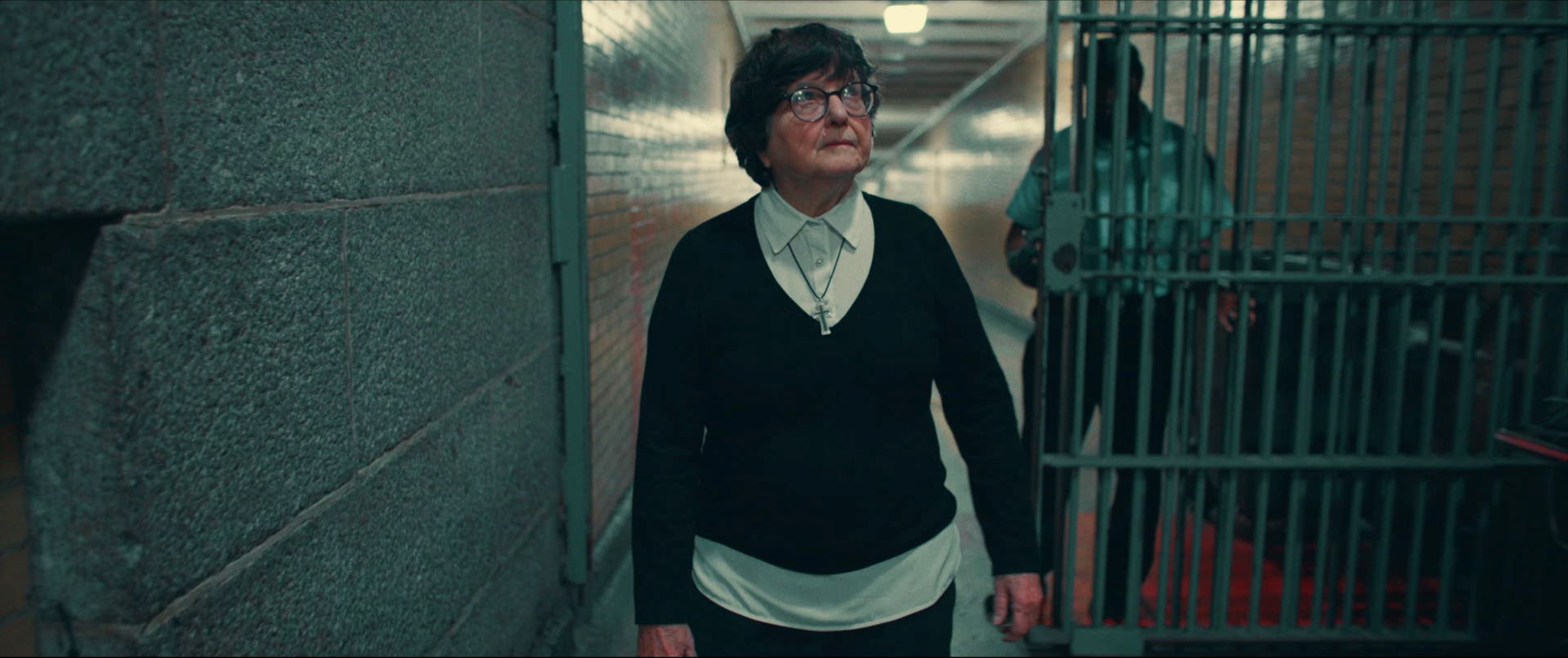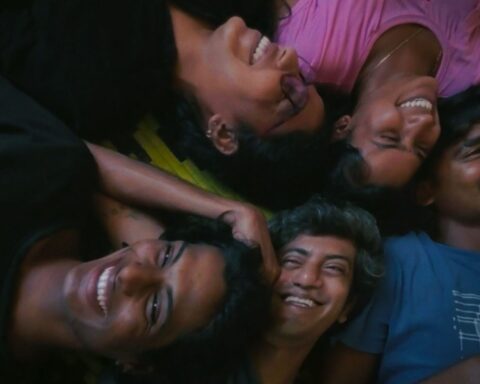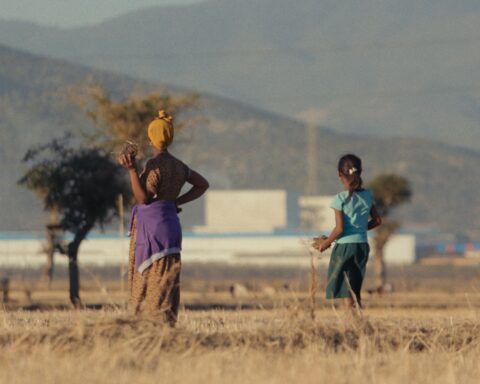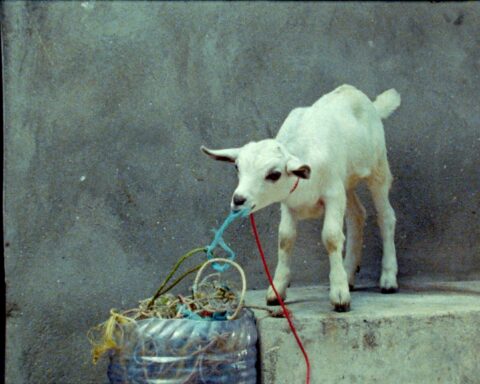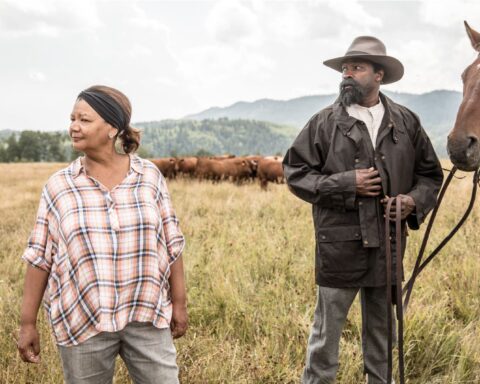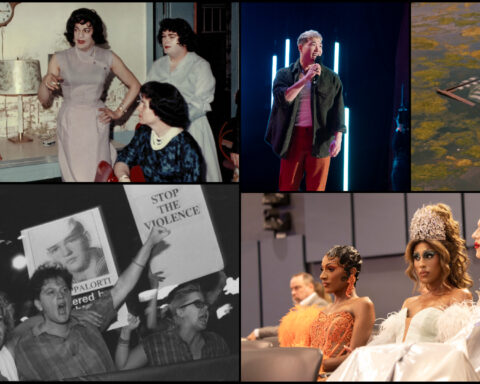Nearly 30 years ago, Sister Helen Prejean’s story moved the world with the drama Dead Man Walking. The 1995 film, based on Prejean’s book of the same name, won Susan Sarandon the Best Actress Oscar for her portrayal of the nun committed to the being spiritual advisor for incarcerated men on death row. Sister Helen’s story—and her fight—continues in Rebel Nun, a documentary directed by Dominic Sivyer premiering at the Tribeca Film Festival. Rebel Nun uses a character-driven approach to observe Sister Helen’s ongoing work advocating for the abolition of the death penalty. Three decades after Dead Man Walking, the film packs a punch with her latest campaign: to save Richard Glossip from death row as he maintains his innocence.
“What immediately attracted to me to the project was that it was an important social issue—the death penalty is an issue which continues to divide people in the United States—but told through a very human way,” says Sivyer, speaking with POV via Zoom. Sivyer says he was approached by Universal and Passion Pictures to direct the project, and that working with Sister Helen provided an ideal lens through which to explore the topic of capital punishment. “It’s rare to be able to combine an important social issue with a life which has been so incredibly lived so far.”
“For me, I knew would be a chance to bring people close to the issue,” adds Sister Helen. She admits to expressing initial reluctance about sharing her story again, but recognizes that she’s the hook for a larger conversation. “If you just do [a film about] an issue, it’s abstract, but to do it through the life of a person, I saw how I could be of help.”
When it comes to being back in the habit, so to speak, Sister Helen seems like a natural before the camera. The Louisiana native has a captivating screen presence and a real gift for gab, which explains why she serves as such a strong advocate. But being a spokesperson doesn’t make the life-or-death stakes of her mission any easier.
“When Tim Robbins was working on the film Dead Man Walking, he kept saying, ‘The nun is in over her head,’” recalls Sister Helen. “That’s the title of the whole bloomin’ thing: ‘in over my head.’ I didn’t know anything about the death penalty, criminal justice. I thought I was bloomin’ gonna write some letters to a man on death row, he would write back, and that’s all the relationship was going to be.”
The first part of Rebel Nun tells of Sister Helen’s formative experience visiting men on death row. She looks back upon her letter exchanges with Patrick Sonnier and Robert Lee Willie and recalls being struck by the power of human connection as the men found solace by corresponding with her. (Sonnier and Willie offer a composite for Sean Penn’s character Matthew Poncelet in Dead Man Walking.) The film shows how she found her calling when she agreed to meet Sonnier in person.
“I filled out the form having no idea that being ‘spiritual advisor’ meant that when Louisiana was going to kill him, the only person who could be with him at the last hours and be there when he was executed was going to be me,” she says. “So truly, I was in over my head.”
Sivyer says he relates to Sister Helen’s sentiment coming to this story of the capital punishment as a British filmmaker. The last executions in the United Kingdom happened in 1964 with capital punishment for murder being abolished in 1969. (The death penalty for treason was abolished in 1998, although it hadn’t been enforced for decades.) “It’s not even within my lifetime that we had it, so I’ve hardly met anyone in my country who is pro-[death penalty],” says Sivyer. The director notes that even with the headlines currently focusing on the case of British serial killer Lucy Letby, who killed seven infants, conversations about the death penalty are rare in the U.K.
“I started very much from a point of view that it’s bizarre, it’s archaic. It’s odd as a British person to look at America, this beacon of democracy, and yet have this huge contradiction on their hands that they still have it,” says Sivyer. “However, I actually became more understanding of both sides of the issue having made the film.”
Rebel Nun invites a difficult conversation about the pros and cons of capital punishment. It introduces the story of Lizabeth Hathaway, whose sister Faith was brutally murdered by Robert Lee Willie. While the documentary employs Sister Helen’s story and work to illustrate the failures of the death penalty—the coldness, the systemic failures that increase the likelihood of capital punishment for Black men and People of Colour, and the tragic reality that wrongfully convicted Americans die on death row—it brings the victims’ families into the conversation.
“We spent some time with Faith Hathaway’s sister, in such pain and trauma, to understand her experience of losing her sister at such a young age. I can understand that visceral pain, and I can understand that want to get rid of it, and to get rid of the person who caused it,” observes Sivyer.
Sister Helen notes that she got to be at the side of her own sister, Mary Ann, when she died from cancer, but can recognize the pain that families feel. She adds that she’s spoken Hathaway over the years and supports her inclusion in the film. “I hope that she could just be brutally honest and say whatever she wanted to say about me,” says Sister Helen. Hathaway is indeed frank and asks how anyone can stand beside someone who did something so monstrous and leaves others reeling in pain.
While Hathaway’s story is extremely compelling, the director credits Sister Helen for welcoming the tough criticism of her advocacy for the rights of the man who killed Faith. “What was really important for us was to not just leave it at: ‘This is one view, and this is another you need to come to some sort of conclusion,’” says Sivyer. “The argument that Sister Helen makes after Robert Lee Willie’s case is that revenge just eats you up inside, and so you must move beyond that. We can all take something from that message, even if it’s not really about capital punishment, but the idea of finding some sort of peace and resolution without such hateful feelings, and without that need for revenge.”
“The other thing where I know I’m in over my head is trying to make the argument about the victims,” admits Sister Helen. She says it’s never easier when prosecutors in death penalty cases make the closing arguments by emphasizing the pain of the victim’s family to make an emotional case for capital punishment. “It’s a pretense that the prosecution uses to try to justify or to make right what they’re doing,” she adds. “In the end, the way the death penalty is set up, prosecutors don’t have to kill anybody. They always have the option of not doing death and they and they use the victim’s families.”
However, Sister Helen notes that on average, families wait 17 years to get justice for victims between conviction and execution. Delayed justice invites audiences to consider what’s at stake when lives are inherently politicized by such a complex topic.
While the film features some tough love for Sister Helen—there are also comments that she’s in it for money and fame—Rebel Nun leans into her desire to have difficult conversations that ultimately help people arrive at their own conclusion about the futility of capital punishment. The film adds to a growing body of documentaries like All the Beauty and the Bloodshed, The Territory, and Daughters that go beyond the passive director-subject relationship and engage their participants in the creative process. The end credits, for example, follow Sivyer’s director card with one that reads “in collaboration with Sister Helen Prejean.”
The director says the collaborative nature of the project was a necessity from the outset. One of the first things they shot was the moment in Richard Glossip’s case when he received his execution date. Sivyer recalls scrambling to get his gear together, flying from the U.K. to Oklahoma to meet Sister Helen and Lea Glossip, Richard’s wife, and then driving to the prison. “You can’t make a film like this without it being a collaborative approach,” explains Sivyer. “You cannot be thrust into the midst of that dramatic situation in any other way. But with Sister Helen, we did start very much in medias res.”
Capturing a turning point in Glossip’s case lets Sister Helen do the introductions, explain the legal processes, and the details of the case. The film draws upon this authority that she brings in real time to command a situation. “We got into the depths of different cases and she gave me all this information, but she never dictated how we told the story,” Sivyer notes.
“If you’re going to turn you work over to artists and tell your story, it is got to be people you trust,” agrees Sister Helen. “With Dead Man Walking, it was Susan Sarandon first who believed that we needed a film and pestered Tim Robbins for nine months.” She notes that collaboration played a role in that film too as she workshopped the screenplay with Robbins, including correcting his script note that put her in a habit even though nuns hadn’t worn them for 30 years. Alternatively, Sister Helen says that sharing vulnerable moments of her experience with Patrick Sonnier leant the film its emotional power.
“There’s a scene in [Dead Man Walking] where the only private place I had in the Death House was in the women’s row,” she explains. “There’s a scene they captured in the film, that’s actually really close to what happened: I put my head against the tile wall and the prayer was, ‘God, please don’t let him fall apart. If he falls apart, I’ll fall with him.’ I was hanging by a thread. The prayer was as much to hope that he would hold up, or I was going to fall with him.”
While Sivyer notes that collaboration helped illuminated nuances of the American carceral system, relationship building proved essential as he observed Sister Helen’s ease with the camera and strength as a speaker. “Because the stories had been told so many times, it was really important to get to some of Helen’s fragilities and some of the vulnerabilities that she showed. Because she’s so strong, that wasn’t so easy early on.” Sivyer says that Sister Helen is asked to discuss her work so frequently that she was doing media interviews when they took breaks from their own interviews for the film.
Rebel Nun draws upon two master interviews with Sister Helen: one more composed interview shot near the beginning of production and one more casual interview shot on handheld near the end. The latter interview favours moments in which Sister Helen encountered a test of faith, felt weak, or experienced a sense of isolation in her advocacy. “I think that kind of interview, and the candid responses that she gave, can only happen when there’s total trust,” Sivyer adds. “She really managed to relax and opened up her heart.”
The candid underscore Sister Helen’s gift for relating to people during the most vulnerable moments in their life. She says that skill simply comes from affording people their humanity. “Even those who have made terrible mistakes and, even in a fit of who knows what, have killed someone else, they are still human beings,” she says. “I experience it as a kind of privilege to be able to accompany them. If I had their childhood, if I had been abused as so many of them have, I think I’d be a grease spot on the floor.”
Rebel Nun culminates with the race to save Glossip’s life as Sister Helen and Lea gain significant media attention for Richard’s case, but confront the fact that no man for whom Sister Helen has advocated has been spared. The plight draws the likes of Kim Kardashian to help mobilize support for a man who maintains his innocence. The urgency of the situation, however, means that Sivyer faced two very different outcomes for the Glossips and Sister Helen. “It’s not very conclusive, so that is frustrating for Richard more than anyone, but I suppose it’s representative of the situation that he’s in,” says Sivyer. “It’s really difficult to have any sort of closure. His life is a series of inconclusive events.”
“It’s like all these eddies in the river all around you,” agrees Sister Helen, “but my focus is on that one human being I am accompanying and helping, who right now is Manuel Ortiz on death row in Louisiana, going on 30 years. The man’s innocent. The corruption of his trial and the prosecutor is unspeakable. He may well die at Angola state prison, but he’s saying to me, ‘I just want the truth to come out,’ so I have a mandate from him.”




